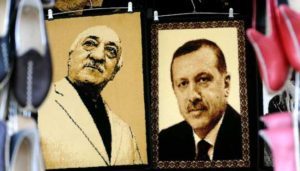
During the rise of Erdogan’s Justice and Development Party (AKP), Fethullah Gülen (left)and Recep Erdogan were allies, united by their deep faith. Today they despise each other. Recep Erdogan is seen as leading Turkey to an increasingly Islamist dictatorship while Fethullah Gülen is seen as being one of the most important preachers of modernist Islam and, according to the Turkish government,. the leader of the effort to overthrow that government. The preacher has been living in American exile since 1999. When Gülen went into exile, he called on his supporters to take over power in Turkey by infiltrating state institutions, thus prompting law enforcement officials to issue an arrest warrant for him. Now Hizmet, Gulen’s privatization operates a global network of schools, firms and media companies bit is seen as a a terrorist organization by Erdogan’s people. Gülen’s guarded complex, located near the small town of Saylorsburg, Pennsylvania, around 100 miles from New York, is considered by officials in Ankara to be the headquarters of its greatest enemy.
“If they find that I am guilty, then I will go to the execution chamber. But that won’t happen because I haven’t done anything.”
After a week of Donald Trump’s dyspeptic view of America, it is worthwhile reading about the story of an Iman, Turkey claims caused the effort at revolution.
(Redacted from Der Spiegel CLICK here to read full inteview)
Those visiting the 75-year-old Fethullah Gülen are subjected to a security screening at the entrance to his spacious complex, with armed guards conducting checks of each guest. The subject of anonymous death threats, the FBI advised Gülen to take this precaution several years ago. There are several buildings on the park-like property where his followers dedicate themselves to prayer. Few people are in sight and a Porsche SUV can be seen in a parking spot. Normally, guests are only rarely received here — and the media have virtually no access.
His organization has millions in assets at its disposal, but Gülen himself claims to have practically no personal belongings. His aides say that he lives solely for his faith. His small apartment, which he has willingly opened up to his visitors on this day, has two rooms. He sleeps on a mattress on the floor, and next to it is a desk with books on it, small bottles of oil and a little Ottoman treasure box. A picture of the Dome of the Rock in Jerusalem is hanging on the wall and a Turkish flag covers the shelf.
Fethullah Gülen is sitting in a small reception room in his home. There’s a small side table next to him, a blue fan and a glass of water. He wears a dark blazer and leather slippers. The elderly man has something he wants to say.
Gülen speaks in Turkish with a quiet voice, but his answers are long — very long. The preacher comes across like a statesman himself as he talks about Erdogan. He knows the Turkish president well.
“I am prepared to be screened by an international commission,” he says. “If they find that I am guilty, then I will go to the execution chamber. But that won’t happen because I haven’t done anything.”
But after the parliamentary elections in 2011, in which Erdogan’s party won almost 50 percent of the vote, Erdogan apparently felt strong enough on his own to break the pact with Gülen. Erdogan fired important justice officials and party functionaries considered to be Gülen followers. He also ordered the secret services to monitor the movement.
The final break between the two came in November 2013, when Erdogan announced his decision to close the Gülen movement’s tutoring centers. Around 2 million Turkish youth visit the schools in order to prepare for university entrance examinations. They provide Gülen with his most important source of revenue, but also serve as places where he can recruit new followers.
Gülen, believes that his one-time friend has become a tyrant intent on eliminating any opposition:
“Erdogan is so hungry for power that he believes everyone else is too. “Erdogan comes from a poor background and now he lives in many palaces. Success and power have poisoned him.”
Gülen insinuates it may have been Erdogan himself who staged the (recent failed) putsch in order to strengthen his power and he notes that the president spoke of a golden opportunity to conduct a purge. But Gülen says he was also surprised by the unusual course taken by the putsch. After all, he said, the rebels failed to eliminate the political leadership right at the beginning. In effect, he is spinning his own conspiracy theory to counter Erdogan’s. But he has no proof.